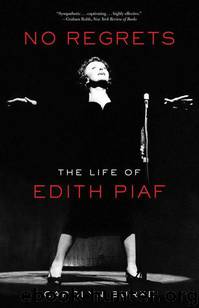No Regrets: The Life of Edith Piaf by Carolyn Burke

Author:Carolyn Burke [Burke, Carolyn]
Language: eng
Format: epub
Publisher: Independent Publishers Group
Published: 2012-04-01T04:00:00+00:00
Some believed that Piaf worshipped the boxer for the rest of her life because he left it when their love was at its height. “If it had gone on another year,” Berteaut conjectured, “she might have dismissed him, like all the others.” Although Danielle Bonel rarely agreed with Berteaut, she too thought that it was Cerdan’s untimely death that kept Piaf from forgetting him. In this view, his leaving her before she could tire of him allowed their story to take on mythic proportions. An early Piaf biographer wrote: “Had he lived, he probably would not have ‘lasted’ longer than the others. We must demystify this story from the start and see it as a dream, the perfect image of Piaf’s life, a bright, naïve cliché from her dark legend.”
Although tempting, it is beside the point to speculate about their relationship had Cerdan survived. Piaf’s view of earthly love as akin to the divine is disconcerting to those who do not sympathize with her spirituality. But, whatever one thinks of her mystical bent, it is more fruitful to grasp what the loss of Cerdan meant to the singer’s imagination than to “demystify” her response—to see how it shaped the rest of her career and her rapport with the audiences who shared her grief. To this end, we may recall the Freudian notion of sublimation—the coping mechanism by which erotic energy is transformed into achievements like artistic expression. From this perspective, Piaf’s actions after Cerdan’s death may be seen as ways of refocusing her energy, comforted by the knowledge that, in their own way, her compatriots mourned the death of their hero along with her.
Piaf’s fans embraced her on her return to Paris. On March 13, she sang on national television. On March 14, 16, and 18, she performed to sold-out houses at the Salle Pleyel. The opening-night audience, which included Paulette Godard and Maurice Chevalier, was overwhelmed. “She brought to life all of suffering humanity,” a critic wrote. “Each time she comes back to us from America, we are astonished by her repertoire and captivated all over again.” Her entire show—lights, staging, orchestrations—was “perfection,” he continued, but it was her particular “genius” that made audiences feel that, though she had just returned “from the land of the dollar,” her songs exhibited the same humility she had always possessed. Audiences were gripped with emotion each time she sang “Hymne à l’amour,” from then on backed by a chorus of angelic voices: the song would come to have almost mythic status. “She’s no longer just a woman,” a teary-eyed spectator exclaimed, “she’s a god.”
Critics and fans alike turned to religious imagery to express what they felt. “Piaf is a fallen angel, a creature of heights and depths,” another critic rhapsodized. “Her story is simple: she begins with love and ends with death.” It was agreed that Cerdan’s name was not to be mentioned, but readers understood the reference, just as they grasped the critic’s allusion to the singer as Mary Magdalene. Over
Download
This site does not store any files on its server. We only index and link to content provided by other sites. Please contact the content providers to delete copyright contents if any and email us, we'll remove relevant links or contents immediately.
| Actors & Entertainers | Artists, Architects & Photographers |
| Authors | Composers & Musicians |
| Dancers | Movie Directors |
| Television Performers | Theatre |
Cecilia; Or, Memoirs of an Heiress — Volume 2 by Fanny Burney(31956)
Cecilia; Or, Memoirs of an Heiress — Volume 3 by Fanny Burney(31942)
Fanny Burney by Claire Harman(26603)
We're Going to Need More Wine by Gabrielle Union(19046)
Plagued by Fire by Paul Hendrickson(17412)
All the Missing Girls by Megan Miranda(16027)
Cat's cradle by Kurt Vonnegut(15355)
For the Love of Europe by Rick Steves(14121)
Bombshells: Glamour Girls of a Lifetime by Sullivan Steve(14075)
Leonardo da Vinci by Walter Isaacson(13336)
4 3 2 1: A Novel by Paul Auster(12392)
The remains of the day by Kazuo Ishiguro(8999)
Adultolescence by Gabbie Hanna(8927)
Note to Self by Connor Franta(7671)
Diary of a Player by Brad Paisley(7578)
Giovanni's Room by James Baldwin(7346)
What Does This Button Do? by Bruce Dickinson(6207)
Ego Is the Enemy by Ryan Holiday(5448)
Born a Crime by Trevor Noah(5382)
